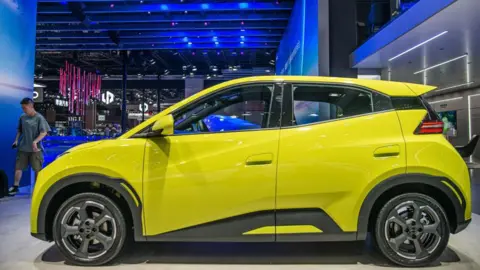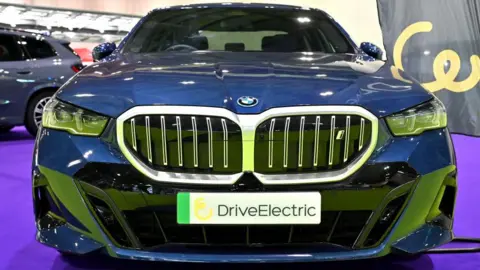Why the EU might be about to make Chinese electric cars more expensive
为什么欧盟可能会让中国电动汽车变得更加昂贵
BBC 国际商务记者
 Getty Images 盖蒂图片
Getty Images 盖蒂图片据说中国公司能够比欧美竞争对手以更低 25%的成本生产电动汽车
With China accused of selling electric cars at artificially low prices, the European Union is widely expected to hit them with tariffs this week.
中国被指控以人为低价销售电动汽车,欧盟普遍预计本周将对其征收关税。
The BYD Seagull is a tiny, cheap, neatly styled electric vehicle (EV). An urban runabout that won’t break any speed records, but nor will it break the bank.
比亚迪海鸥是一款小巧、便宜、造型整洁的电动车(EV)。这是一款城市代步车,虽然不会打破任何速度记录,但也不会让你破产。
In China, it has a starting price of 69,800 yuan ($9,600; £7,500). If it comes to Europe, it is expected to cost at least double that figure due to safety regulations. But that would still be, by electric car standards, very cheap.
在中国,起价为 69,800 元(9600 美元;7500 英镑)。如果进入欧洲,由于安全法规,预计价格至少会翻倍。但从电动汽车的标准来看,这仍然是非常便宜的。
For European manufacturers that is a worrying prospect. They fear the little Seagull will become an invasive species, one of a number of Chinese-built models poised to colonise their own markets at the expense of indigenous vehicles.
对于欧洲制造商来说,这是一个令人担忧的前景。他们担心这只小海鸥会成为一种侵入性物种,成为一系列中国制造的车型之一,准备占领他们自己的市场,损害本土车辆。
China’s domestic auto industry has grown rapidly over the past two decades. Its development, along with that of the battery sector, was a major component of the “Made In China 2025” strategy, a 10-year industrial policy launched by the Communist Party in Beijing in 2015.
中国国内汽车行业在过去的二十年里迅速发展。它的发展与电池行业的发展一起,是中国共产党于 2015 年在北京推出的为期十年的“中国制造 2025”战略的重要组成部分。
The result has been the breakneck development of companies like BYD, now vying with Tesla for the title of the world’s biggest manufacturer of electric vehicles. Established giants such as SAIC, the owner of the MG brand, and Volvo’s owner Geely, have also become big players in the EV market.
结果就是像比亚迪这样的公司飞速发展,现在正在与特斯拉竞争世界最大电动汽车制造商的头衔。像上汽集团这样的老牌巨头,拥有 MG 品牌,以及沃尔沃的母公司吉利,也已成为电动汽车市场的重要参与者。
Last year, more than eight million electric vehicles were sold in China – about 60% of the global total, according to the International Energy Agency’s annual Global EV Outlook.
根据国际能源机构的年度全球电动汽车展望报告,去年中国售出了超过 800 万辆电动汽车,约占全球总量的 60%。
For policymakers in Europe and the US, however, this is a cause for concern. With Chinese brands having plenty of surplus capacity and moving into international markets, they fear their own companies will be unable to compete. They claim hefty subsidies for domestic production allow Chinese firms to keep prices at a level other firms will struggle to match.
对于欧洲和美国的决策者来说,这是一个令人担忧的问题。随着中国品牌拥有大量过剩产能并进军国际市场,他们担心自己的公司将无法竞争。他们声称国内生产的大额补贴让中国企业能够保持价格在其他公司难以匹敌的水平。
According to a report by the Swiss bank UBS, published in September, the Chinese advantage is real. It suggested that BYD could produce cars at some 25% lower cost than the best of the legacy global carmakers.
根据瑞士银行瑞银 9 月发布的一份报告,中国的优势是真实的。该报告指出,比亚迪可以以比传统全球汽车制造商中最优秀者低大约 25%的成本生产汽车。
It said BYD and other Chinese firms were “set to conquer the world market with high-tech, low-cost EVs for the masses”.
它表示比亚迪和其他中国公司“准备用高科技、低成本的电动汽车征服全球市场”。
Meanwhile, earlier this year, the Alliance for American Manufacturing warned that the introduction of cheap Chinese cars could be an “extinction-level event” for the US auto industry. It called for a “dedicated and concerted effort to turn those imports back”, concluding that there was “no time to lose”.
与此同时,今年早些时候,美国制造联盟警告称,廉价中国汽车的引入可能对美国汽车工业构成“灭绝级事件”。它呼吁“全力以赴,千方百计将这些进口商品遣返”,并得出结论称“没有时间可耽搁”。
Last month, the US took decisive action. The Biden administration raised its tariff on imports of Chinese battery-powered cars from 25% to 100%. Sales of Chinese-made EVs in the US are currently negligible; with the new tariffs, they are likely to stay that way.
上个月,美国采取了果断行动。拜登政府将对中国电动汽车进口关税从 25%提高到 100%。目前在美国销售的中国制造的电动汽车数量微乎其微;有了新的关税,这种情况可能会继续下去。
The move was part art of a wider package of measures targeting imports from China that has been condemned by Beijing as "naked protectionism".
At the same time, the US is subsidising its own car industry, through tax incentives that make domestically-produced vehicles cheaper to buy.
The EU appears to be taking a more moderate approach, despite tough rhetoric.
In her state of the Union address in September last year, the European Commission president Ursula von der Leyen announced an investigation into Chinese imports.
“Global markets are now flooded with cheaper Chinese electric cars," she said.
“Their price is kept artificially low by huge state subsidies. This is distorting our market.”
The initial results of that investigation are now imminent.
It is widely expected that the Commission will provisionally raise duties on EVs imported from China, from the standard level of 10% for third country imports to between 20 and 25%.
 Getty Images
Getty ImagesAccording to Matthias Schmidt of Schmidt Automotive Research, this would be a rather more proportionate response than the US move.
“The 100% tariff is just pure protectionism, regressive and stifles innovation, and prevents a competitive landscape for the consumer," he says.
“If the EU imposes tariffs of no more than 25%, it will be more about levelling the playing field, and evening out the 30% cost advantage Chinese manufacturers have."
Nevertheless, tariffs could hurt European companies as well as helping them.
Firstly, they would not just affect Chinese brands. For example, BMW’s iX3 electric SUV is built at a factory in Dadong and exported to Europe. The company also intends to import large quantities of Chinese-made electric Minis.
Both models would be subject to the tariffs, leaving the manufacturer to absorb the extra cost, or raise prices. The US manufacturer Tesla would also be affected, as it builds cars in Shanghai for export to Europe.
Secondly, although European makes have invested heavily in production in China in recent years, in partnership with local manufacturers, a number of them still export high-value models to Chinese markets.
If China wanted to retaliate by imposing its own hefty tariffs, these shipments could be targeted.
 Getty Images
Getty ImagesSmall wonder then, that executives at European carmakers have been distinctly lukewarm about the EU’s initiative.
Earlier this year, Volkswagen Group’s chief executive Oliver Blume warned that the introduction of tariffs was “potentially dangerous”, because of the risk of retaliation.
Last month BMW boss Oliver Zipse told investors “you could very quickly shoot yourself in the foot” by engaging in trade battles, adding “we don’t think that our industry needs protection”.
Ola Källenius, chief executive of Mercedes-Benz has gone a step further, publicly calling for tariffs on Chinese EV imports to be lowered rather than raised, to encourage European companies to do a better job.
Support for the EU investigation has largely come from France. Yet even among French manufacturers, there is doubt as to whether tariffs are the correct approach.
Carlos Tavares, head of the Stellantis group which includes Peugeot, Citroen, Vauxhall/Opel and DS, has described them as “a major trap for countries that go down that path”.
He has warned that European carmakers are in a "Darwinian" struggle with their Chinese rivals, something that is likely to have social consequences as they pare back costs in an effort to compete.
Renault’s chief executive Luca de Meo, meanwhile, says “we are not in favour of protectionism, but competition must be fair”.
He has called for the adoption of a strong European industrial policy to promote the sector, taking inspiration from policies launched by the US and China – in an effort to compete with both.
Meanwhile, the UK is looking on with interest. The head of the country’s trade watchdog, the Trade Remedies Authority, has previously made it clear he would be ready to set up an investigation into Chinese EVs, if ministers or the industry wanted it.
So far it is understood no such request has been made. Ultimately, as a deeply political issue, it will be something for the next government to address, after the election.
What higher tariffs may give Europe is more time for both car manufacturers and policymakers to adapt to the challenge from China.
But many within the industry acknowledge that if Europe is to remain a major player in the global automotive sector, it will have to do much more than simply set up barricades at home.